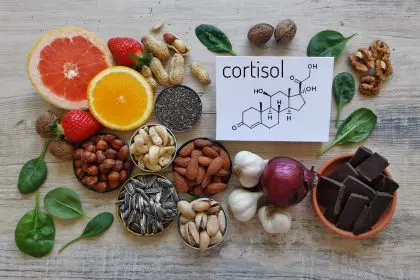The small, butterfly-shaped thyroid gland nestled in the front of your neck may weigh less than an ounce, yet its influence extends to nearly every cell in your body. This metabolic maestro orchestrates how quickly your body burns calories, regulates your heart rate, and even influences your emotional well-being. Despite its outsized importance, thyroid function often remains an afterthought until symptoms become severe. An estimated 20 million Americans have some form of thyroid disorder, with up to 60% unaware of their condition.
The metabolism master gland
The thyroid produces hormones that regulate the speed at which your body operates. Think of it as your internal thermostat, determining how quickly cells convert nutrients into energy. When functioning optimally, the thyroid maintains energy levels, supports healthy weight, promotes cardiovascular health, and even affects cognitive function.
Two primary hormones, thyroxine (T4) and triiodothyronine (T3), carry out most thyroid functions. The pituitary gland monitors blood levels of these hormones, increasing or decreasing thyroid stimulating hormone (TSH) production to maintain balance. This delicate feedback system can be disrupted by nutritional deficiencies, autoimmune responses, environmental toxins, chronic stress, and genetic factors.
Subtle imbalances often manifest as persistent fatigue, unexplained weight changes, temperature sensitivity, and mood disturbances long before standard lab tests detect abnormalities. This makes preventive thyroid support increasingly important for maintaining overall well-being.
Hidden epidemic of suboptimal function
While dramatic thyroid dysfunction receives medical attention, many health experts now recognize that suboptimal thyroid function, sometimes called subclinical hypothyroidism, affects a significant portion of the population. This condition exists in the gray area where standard lab values appear “normal” but symptoms persist.
The reference ranges used for thyroid testing represent statistical averages rather than optimal levels for all individuals. Some people experience symptoms at TSH levels considered acceptable by conventional standards. Additionally, factors like conversion problems (where T4 doesn’t properly convert to the more active T3) can occur despite “normal” lab values.
The situation is further complicated by environmental factors increasingly prevalent in modern life. Exposure to certain chemicals, particularly those classified as endocrine disruptors, has increased substantially over recent decades. These compounds can interfere with thyroid hormone production, transport, and cellular receptivity.
8 tricks for thyroid support
Supporting thyroid health requires a holistic approach addressing nutritional, environmental, and lifestyle factors. Research suggests these eight strategies show particular promise:
Optimize iodine intake: The thyroid requires iodine to produce hormones, but the relationship isn’t simply “more is better.” Both insufficient and excessive iodine can impair function. Most Americans get adequate iodine through iodized salt and dairy products, but vegans and those on low-sodium diets may need to monitor intake more carefully. Seaweed, cod, yogurt, and eggs provide natural food sources.
Ensure sufficient selenium: This mineral plays a crucial role in converting T4 to the more active T3 hormone. Just two Brazil nuts daily can provide adequate selenium, though supplements offering 200 micrograms per day have shown benefits in clinical trials. Other good sources include seafood, organ meats, and mushrooms.
Reduce environmental toxin exposure: Certain chemicals, particularly perfluoroalkyl substances (PFAS) found in some non-stick cookware, water-resistant products, and food packaging, can disrupt thyroid function. Using glass food storage containers, carbon water filters, and avoiding synthetic fragrances can reduce exposure to common endocrine disruptors.
Support gut health: Approximately 20% of thyroid hormone conversion occurs in the digestive tract. Emerging research links gut microbiome health to thyroid function, suggesting that probiotic foods, adequate fiber, and limiting gut irritants may support hormone conversion and reduce autoimmune responses associated with thyroid conditions.
Manage stress effectively: Chronic stress elevates cortisol, which can suppress thyroid function and interfere with hormone conversion. Regular stress-reduction practices, whether meditation, yoga, time in nature, or simply scheduled downtime, appear particularly important for those with thyroid vulnerabilities.
Exercise appropriately: Regular physical activity supports thyroid health, but excessive endurance exercise without adequate recovery may stress the thyroid. The sweet spot appears to be consistent moderate activity combined with strength training, allowing sufficient recovery between intense sessions.
Optimize zinc and vitamin D levels: Both nutrients play supporting roles in thyroid function. Zinc contributes to T3 production, while vitamin D helps regulate immune function, potentially reducing autoimmune thyroid conditions. Blood testing can identify deficiencies requiring supplementation or dietary modifications.
Consider goitrogen intake: Foods like raw cruciferous vegetables, soy products, and millet contain compounds that can interfere with thyroid hormone production when consumed in large amounts. Cooking reduces these effects, and moderate consumption typically poses no problem for those with normal thyroid function, but individuals with hypothyroidism may benefit from limiting raw goitrogen intake.
Medical monitoring remains essential
While lifestyle strategies can support optimal thyroid function, they don’t replace appropriate medical care. Regular screening becomes increasingly important after age 35, particularly for women, who experience thyroid disorders at five times the rate of men.
Beyond standard TSH testing, comprehensive evaluation may include free T3, free T4, reverse T3, and thyroid antibody tests to provide a more complete picture. Some healthcare providers now incorporate symptom assessment alongside lab results when determining treatment approaches.
The complementary relationship between lifestyle optimization and medical care offers the best outcomes. Those with diagnosed conditions should discuss lifestyle changes with healthcare providers rather than attempting to replace prescribed medication.
Individual variations require personalized approaches
The complexity of thyroid physiology means that standardized approaches often fall short. Factors like genetics, gut health, stress load, and environmental exposures create unique profiles requiring individualized strategies.
For instance, some people convert T4 to T3 less efficiently due to genetic variations, making specific nutrients more important. Others may have heightened sensitivity to environmental toxins or higher vulnerability to stress effects. Even dietary needs vary substantially, with some individuals thriving on higher-carbohydrate plans while others do better with moderate carbohydrate intake.
This individuality explains why generic thyroid support recommendations sometimes disappoint, and why working with knowledgeable healthcare providers who consider the full spectrum of influencing factors often proves more effective than self-directed approaches.
Wider implications of thyroid health
The consequences of suboptimal thyroid function extend far beyond fatigue. Researchers continue discovering connections between thyroid health and conditions ranging from cardiovascular disease to depression, infertility, and cognitive decline.
The thyroid’s far-reaching influence means that supporting its function may provide benefits beyond immediate energy improvements. As integrative medicine approaches gain traction, the thyroid increasingly represents a focal point for interventions aimed at supporting overall health and preventing chronic disease.
For the millions experiencing unexplained fatigue, weight challenges, mood disturbances, or cognitive difficulties, investigating thyroid function, and implementing supportive lifestyle measures, may provide a critical missing piece in their health puzzle.


















